In honor of Sidney Lumet who passed away this weekend, we're re-publishing The Film Experience retrospective on Network from a few years ago. It's new to some of you!
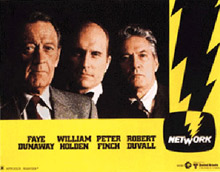
One Angry Man
One thing I suspect about director Sidney Lumet: He liked his drama super-sized, Empire State Building big. No 800 lbs gorillas in the room please, make it King Kong. Give them 16 tons of drama. Lumet wanted grunting, sweating, lunging, screaming, gargantuan desperate drama like the kind you get in Dog Day Afternoon, Before the Devil Knows You’re Dead and Serpico. Never mind 12 Angry Men. How about 1 Angry Man, Sidney Lumet, and in the case of Network -- arguably his best film -- one angry fictional man named Howard Beale (Peter Finch). Network eventually gets around to naming Beale the “mad prophet of the airwaves” but it’s also a self descriptive tag. The movie is mad as hell and prophetic, too. Network is Howard Beale and Howard Beale is Network. This impressively large but also miniature film --it's not hard to imagine it as a stage play -- swings wildly from mood to mood like its bipolar madman.
A lot of movies steal from Network but I love the borrowing that Network does right out of the gate, in omniscient detached voiceover.
In his time Howard Beale had been a mandarin of television. The grand old man of news with a hot rating of 16 and a 28 audience share. In 1969 however his fortunes began to decline. He fell to a 22 share. The following year his wife died and he was left a childless widower with an 8 rating and a 12 share.
We're in the boredom killing business.
That puts us in the shithouse. That's where that puts us.
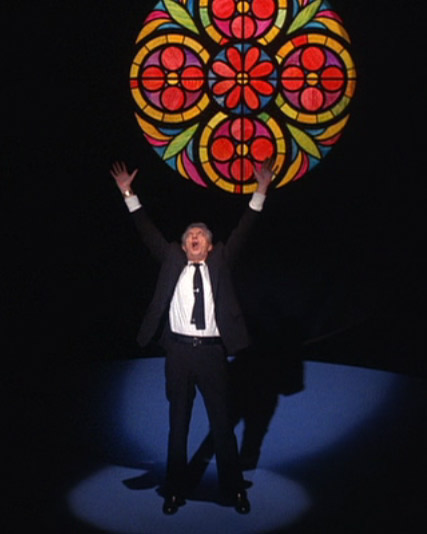 Network is an easy film to quote and its super sculpted and scalding dialogue is undoubtedly the reason why the screenplay (by triple Oscar winner Paddy Chayefsky) is so lauded. It’s the type of talky feature that's jerry-rigged to draw attention to its themes, BIG ideas, diamond hard one liners and showcased monologues. But words aside, the plotting is also tight and strong. I can’t think of a single film that’s more interested in stopping for speeches that also moves with breakneck speed through the twists and turns of its various plots.
Network is an easy film to quote and its super sculpted and scalding dialogue is undoubtedly the reason why the screenplay (by triple Oscar winner Paddy Chayefsky) is so lauded. It’s the type of talky feature that's jerry-rigged to draw attention to its themes, BIG ideas, diamond hard one liners and showcased monologues. But words aside, the plotting is also tight and strong. I can’t think of a single film that’s more interested in stopping for speeches that also moves with breakneck speed through the twists and turns of its various plots.
Plot A: Howard Beale threatens to kill himself on air, leading to rubberneck ratings jumps and corporate exploitation of his sudden insanity. As Beale slips deeper into a complete psychotic break, corporate sharks Diana Christensen (Faye Dunaway) and Frank Hackett (Robert Duvall) start swimming, devouring the smaller fish at the network like Max Schumacher, as they try to capitalize on Beale's popularity with the public who embraces his catchphrase:
I'M AS MAD AS HELL, AND I'M NOT GOING TO TAKE THIS ANYMORE!
Unfortunately Beale's psychosis can't be controlled. When the ratings begin to head south, Diana and Frank coolly take inventory and do as their programming demands. One must respect Sidney Lumet forever for shooting this final deadly meeting in detached almost shudder inducing long shot -- their inhuman words are given all the power. Where are the directors today who know that not every scene should rely on close-ups?
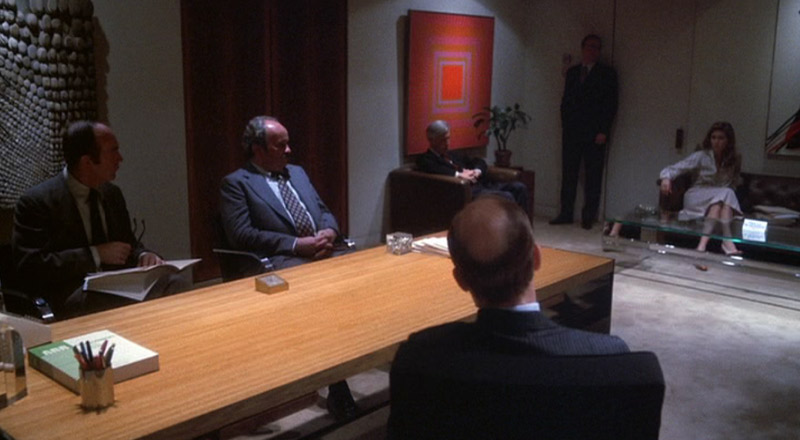
All of a sudden it's closer to the end than the beginning, and death is suddenly a perceptible thing to me, with definable features.
Plot C: Diana, a self described "racist lackey of the imperialist ruling circles", searching for a hit show is inspired by live crime footage she sees. She enters into a business relationship with Laureen Hobbs, a self described "badass commie nigger" and The Ecunemical Liberation Army. They create a show around live footage of acts of political terrorism (Network was doing a vicious satire of reality TV before we even had a name for it). Plot C will collide with Plot A.
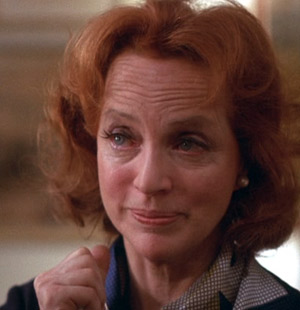 This is not to say that Network doesn't contain amazing performances. Lumet has clearly directed the entire ensemble to go BIG and they do, often with a clear understanding of how to expand without crowding out other players or the movie. Take Beatrice Straight as Max's wife Louise, for a perfect example. The movie has barely any time for her but she seizes her only true scene in a death grip, cramming huge emotional shifts and marital history into an instant polaroid of the abandoned wife.
This is not to say that Network doesn't contain amazing performances. Lumet has clearly directed the entire ensemble to go BIG and they do, often with a clear understanding of how to expand without crowding out other players or the movie. Take Beatrice Straight as Max's wife Louise, for a perfect example. The movie has barely any time for her but she seizes her only true scene in a death grip, cramming huge emotional shifts and marital history into an instant polaroid of the abandoned wife.Another stunner is Ned Beatty as Arthur Jensen who goes even bigger and more theatrical in a role that's all theme embodiment and zero character. You can't judge it in the same way you would a true character role, but his "vast holding company" lunacy feels both inspired and possibly unreal, as if it's been imagined. That's a wise choice for the film. Jensen's unrepentantly theatrical monologue plays as something that might only have been hallucinated, or at least exaggerated, by the mad prophet Beale.You're in for some dreadful grief, Max.
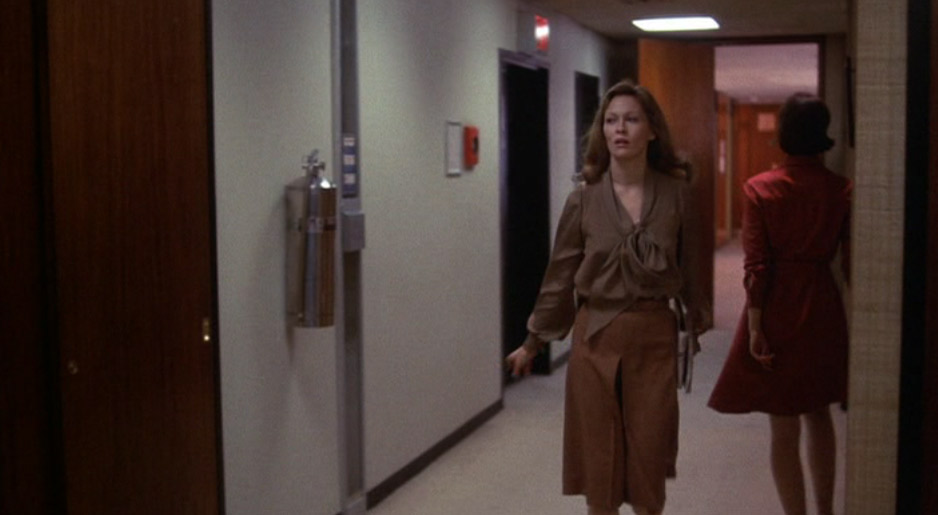
All I know is, you've got to get mad. You've got to say, "I'm a human being, goddamn it. My life has value."
For all of Network big ideas: DEATH, LOVE, CAPITALISM, ENTERTAINMENT, THE CORPORATE VS. THE INDIVIDUAL (capitals intended; the film certainly uses them) and the walking and talking humanoids who spout them, it magically remains human. It gasps, sputters, shivers and rages against the machine.

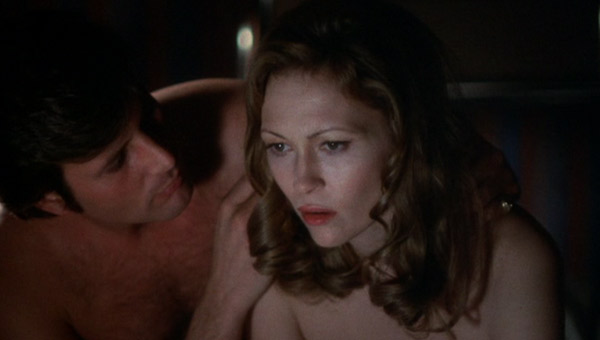
Notes: Network is part of Nathaniel's Personal Canon and a member of the United States National Film Registry for "culturally, historically, or aesthetically significant" movies. It also ranks on the AFI's list of Top 100 Greatest American Films. It was nominated for 10 Academy Awards for the 1976 film year and won four: Best Actor (Peter Finche), Best Actress (Faye Dunaway), Best Supporting Actress (Beatrice Straight) and Best Screenplay (Paddy Chayefsky). It lost the Best Picture prize to Rocky. It's only Best Picture prize was from the Los Angeles Film Critics Association where it tied with Rocky. Sidney Lumet, a five time Oscar nominee, was given an honorary Oscar in 2005 but never won competitively. Lumet RIP.